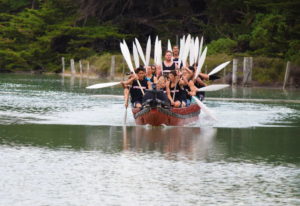 Polynesians settled in New Zealand in 1250-1300 AD and developed a distinctive Maori culture. Europeans first made contact in 1642 AD.
Polynesians settled in New Zealand in 1250-1300 AD and developed a distinctive Maori culture. Europeans first made contact in 1642 AD.
The first Europeans known to have reached New Zealand were Dutch explorer Abel Tasman and his crew in 1642. Four of them and one Maori were killed. Europeans did not revisit New Zealand until 1769 when British explorer James Cook mapped almost the entire coastline.
Following him, several ships cruised near New Zealand trading food, metal tools, weapons and other goods for timber, food, artefacts, water, and, on occasion, sex. Europeans introduced potatoes, diseases and animals. The introduction of weapons resulted in Musket Wars between the Maori tribes encompassing over 600 battles between 1801 and 1840. Between 30,000 and 40,000 Maori were killed. Their population declined 40% during the 19th century.
The Treaty of Waitangi that claims sovereignty for the British Crown was signed in the Bay of Islands on 6 February 1840. New Zealand, originally part of the colony of New South Wales, became a separate Crown colony in 1841. Following concerns that the South Island might form a separate colony, the crown transferred the capital from Auckland to Wellington due to its harbour and central location. The parliament officially sited over there for the first time in 1865.
As immigrant numbers increased, conflicts over land led to the New Zealand Land Wars of the 1860s and 1870s, resulting in the loss and confiscation of much Maori land. From then on, notable dates include:
- 1893: the country became the first nation in the world to grant all women the right to vote.
- 1894: New Zealand pioneered the adoption of compulsory arbitration between employers and unions.
- 1907: New Zealand declared itself a Dominion within the British Empire.
- 1947: the country adopted the Statute of Westminster, making New Zealand a Commonwealth country.
New Zealand is now a constitutional monarchy with a parliamentary democracy. Queen Elizabeth II is the Queen of New Zealand and the head of state. The Queen is represented by the Governor-General, whom she appoints on the advice of the Prime Minister.
New Zealand was involved in world affairs, fighting alongside the British Empire in the first and second World Wars. A Maori protest movement developed after WWII, which worked for greater recognition of Maori culture and the Government has negotiated settlements of these grievances.
